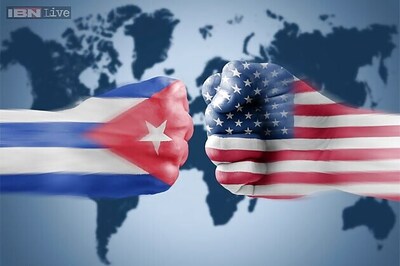
views
In his first interaction with party functionaries after the district development council (DDC) poll results, National Conference vice president Omar Abdullah mocked the Bharatiya Janata Party, saying considering the drubbing it received in the elections, the government won’t consider holding assembly polls for a long time.
”I don’t think the government will blow the bugle of the assembly polls now,” he said at the party headquarters in Srinagar, inviting a huge round of applause from the workers.
The BJP is not conceding the success of Gupkar Alliance and in fact says it has made inroads in Kashmir, a new frontier, and in future, a key to capture power through the assembly. For the arithmetic, however, it needs the help of a Kashmir party and disparate independent lawmakers. Those equations would come into play as and when assembly polls in the erstwhile state are conducted.
As of today, the Gupkar Alliance, riding on the NC’s vast support structure, has achieved big success against all odds. Its top leaders including three former chief ministers had come out of incarceration periods when the DDC polls were foisted on them. Some leaders were undecided on taking the electoral bait given the public sentiment that they felt was against Delhi and even Kashmir mainstream or unionists.
There was hardly any time for the alliance to strategise or pick the best winnable faces because the leaders could not consult the local district of block level leaders. The alliance leaders could hold only a few meetings in between discussing candidates.
Also, the structure of the unionists had collapsed because of the crackdown on leaders coinciding with the abrogation of Jammu and Kashmir’s special status. No instructions flowed for around a year and the coordination codes were snapped like the mobile internet services. Things ran in vacuum.
Many believe the Gupkar Alliance could have done better had the star campaigners hit the ground. While it is true there were restrictions on them to move on occasions, they chose not to canvass apparently because they had no faith on the polls being fair or without duress. Alliance chairman Farooq Abdullah and his deputy Mehbooba Mufti were home-detained on many occasions. Abdullah was even summoned a couple of times by the Enforcement Directorate. Mufti’s key aide Waheed Para, a DDC candidate and important mobiliser for the party, was picked up by the National Investigation Agency. He continues to be in judicial custody, though he won with a decent margin in Pulwama. Many alliance candidates had alleged they were locked up and not allowed to campaign while their rivals were given a free run.
In spite of the odds, the grouping of the Kashmir parties that vowed to fight for restoration of Article 370 provisions in J&K has done well in the Valley and even made significant gains in the BJP stronghold of Jammu. The BJP had won 25 of the 37 assembly segments including some in Muslim-dominated regions of Pir Panjal and Chenab Valley in 2014 and both Parliament seats in 2018. It would have hoped to consolidate further after the watering down of Article 370 in August 2019, but 16 months later it has suffered unexpected losses. Observers say the reason could be that it failed to convince the people on how jobs, education and land for local residents could be safeguarded in the new constitutional arrangement.
Instead of keeping an ear to the ground, the BJP leadership refuses to acknowledge its loss.
Delimitation designs
The failure to plug loopholes will hurt the BJP in the longer run and crucially its long time ambition of installing a Hindu chief minister for the first time in the past six decades in Muslim-majority Jammu and Kashmir. Many BJP leaders have admitted that they are working towards this and would not shy away from using a “Hindu J&K CM” as a plank to woo voters for the assembly polls.
In fact, the saffron party is leaving no stone unturned to achieve the dream on the ground. A delimitation exercise aimed to redraw or reconfigure the assembly constituencies is underway to even out the numerical edge of the Valley.
There are widespread apprehensions in Kashmir that the delimitation team might award more seats to the Hindu belt on the basis of population density rather than on the overall population. After the J&K state was reconfigured into two union territories, the strength of the new assembly has fallen by four members, previously kept for two lakh residents of Ladakh, to 83. That would have effectively meant 46 representatives for 80 lakh residents of Kashmir and 37 for 65 lakh Jammu residents.
The scenario is likely to change. Observers believe the game plan is to allot more seats to Jammu on the pretext that some have a larger population size than the ones in Kashmir. The addition of around one lakh West Pakistan refugees who secured domiciles earlier this year could also be cited as a reason for Jammu’s bigger seat share.
But in spite of the proposed advantages, the BJP will find it tough to fully capture the erstwhile state, if the DDC results are any indication. There are two reasons for that. Firstly, the Gupkar Alliance (read NC) has been able to revive its pan-J&K position by not only winning seats in Muslim areas but also gaining entry in the Jammu plains. Secondly, it has been able to intelligently stitch up a seat-sharing pact with the Congress and independents in some districts of the Jammu region, Kishtwar and Rajouri being cases in point.
The Congress, despite its flip-flop on its truck with the Gupkar Alliance, has done well, again at the cost of the BJP. It won 17 of the 27 seats in Jammu. Together with the NC, it has been able to take at least four of the 10 districts from the Jammu region. It could have been worse for the BJP had not Apni Party and a few independents softened the blow in another district of Jammu. That two BJP ministers lost and a seat was wrestled in J&K state president Ravinder Raina’s hometown of Nowshera and Rajouri despite the fact that it has a mixed population does not augur well for the top national party.
The BJP strategy to seek support from new parties to enter the Valley or cobble together an alliance that would win substantial seats has not worked. It had pinned a lot of hopes on Apni Party to win 30 odd seats, considering two dozen former legislators from mainly PDP, NC and Congress had joined it. But Apni Party’s 12 seats would hardly change the BJP’s fortunes.
Who won how many seats, districts
The Gupkar Alliance won 110 of the 280 seats across 20 districts while the BJP bagged 75, including three in the Kashmir Valley. The BJP said it was the single-largest party but Omar Abdullah maintained that NC had contested on far fewer seats because it had to accommodate other alliance partners.
Meanwhile, the alliance is set to form councils in 13 of the 20 districts with Congress help in two. The BJP can take six while Srinagar district can go either way.
The Gupkar Alliance’s victory is seen as a strong rebuff to the BJP whose leaders had called it a “gang” and its members “anti-nationals”, “corrupt” and “thieves”.
Alliance leaders want the polls to be seen as the first public expression of anger against the scrapping of Article 370 provisions. They say the DDC verdict should force the Centre to rethink its decision to cancel the special status.
Mohammad Sayeed Malik, noted columnist, says before the DDC polls, the BJP was comfortably placed in its Jammu bastion but the Gupkar Alliance and Congress have made inroads into its fortress. ”The BJP has to now divide its energies on both Jammu as well as Kashmir. Its sole focus to capture Kashmir led to its losses in Jammu,” he said.
As far as the Gupkar Alliance goes, Malik said he was not sure whether the partners would stick together for the assembly polls. ”There are multiple pressures in assembly elections. “The stakes are higher,” he said, adding that the parties would stay together for some time.
Read all the Latest News, Breaking News and Coronavirus News here



















Comments
0 comment